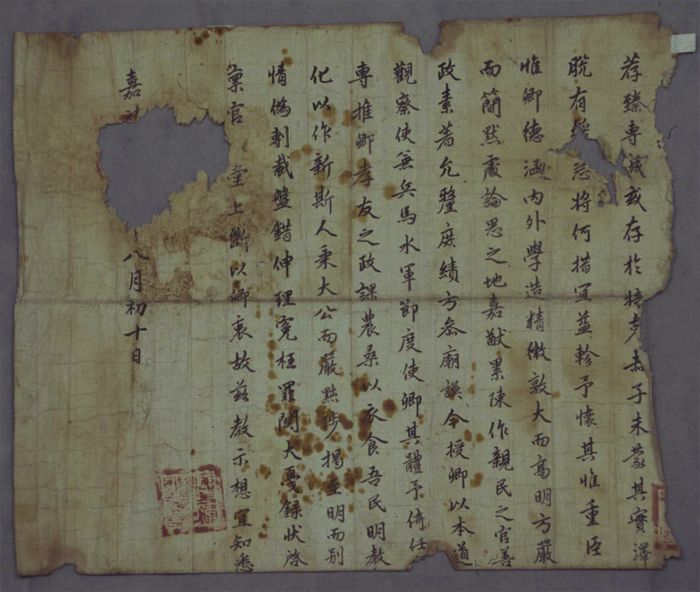(Translation) 1543年 李彦迪諭書
| Primary Source | ||
|---|---|---|
 |
Title | |
| English | ||
| Chinese | 1543年 李彦迪 諭書 | |
| Korean(RR) | 1543년 이언적 유서(Yi Eonjeok Yuseo) | |
| Text Details | ||
| Genre | Royal Court Documents | |
| Type | Instructions | |
| Author(s) | 國王:中宗 | |
| Year | 1543 | |
| Source | Old Documents and Sources (한국고문서자료관) | |
| Key Concepts | ||
| Translation Info | ||
| Translator(s) | Participants of 2019 JSG Summer Hanmun Workshop (Advanced Translation Group) | |
| Editor(s) | ||
| Year | 2019 | |
목차
- 1 Introduction
- 2 Original Script
- 3 Discussion Questions
- 4 Further Readings
- 5 References
- 6 Translation
- 6.1 (sample) : Jaeyoon Song
- 6.2 Student 1 : Yishu Ma
- 6.3 Student 2 : Samuel Sai Hay Chan 陳世熙 진세희
- 6.4 Student 3 : Younès M'Ghari
- 6.5 Student 4 : King Kwong Wong
- 6.6 Student 5 : 신동조
- 6.7 Student 6 : Stacey Lui
- 6.8 Student 7 : (Write your name)
- 6.9 Student 8 : Q
- 6.10 Student 9 : Yeonjae Ra
- 6.11 Student 10 : (Kanghun Ahn)
- 6.12 Student 11 : (Write your name)
- 6.13 Student 12 : (Write your name)
- 6.14 Student 13 : (Write your name)
- 6.15 Student 14 : (Write your name)
Introduction
Original Script
| Classical Chinese | English |
|---|---|
|
▣…▣ 荐臻專城或存於▣▣ 赤子未蒙其實澤 脫有▣(緩)急, 將何措, 宜益軫, 予懷其惟重臣 惟卿, 德涵內外, 學造精微, 敦大而高明, 方嚴而簡默, 處論思之地, 嘉猷累陳, 作親民之官, 善政素著, 允釐庶績, 方參廟謨, 今授卿以本道觀察使兼兵馬水軍節度使 卿其體予倚任 專推卿孝友之政 課農桑以衣食吾民 明敎化以作新斯民 秉大公而嚴黜陟 揭至明而別情僞 剸裁盤錯 伸理冤枉, 罪關大憂, 錄狀啓稟官 堂上斷以卿衷 故玆敎示 想宜知悉 嘉靖▣…▣八月初十日
|
(translation) |
Discussion Questions
Further Readings
References
《書·堯典》:“允釐百工,庶績咸熙。”
Translation
(sample) : Jaeyoon Song
- Discussion Questions:
11. 罪關大憂, 錄狀啓稟官 堂上斷以卿衷, 故玆敎示 想宜知悉 If the crimes should raise grave concerns, you should report to the office, and the high ministers (ranking 3a and above) will make a judgment based on your faithful report. I, the king, hereby instruct you thus, and you should consider and remember all my instructions.
Student 1 : Yishu Ma
- Discussion Questions:
荐臻專城或存於▣▣赤子未蒙其實澤
Translation: Successive local officials might be ... Common people have not yet received the real benefits [of governance].
Student 2 : Samuel Sai Hay Chan 陳世熙 진세희
眖有▣(緩)急將何措宜益軫予懷其惟重臣
There are matters non-urgent and urgent. What to do with them? One ought to handle them with more measured deliberations. I can only think of one right minister [who is qualified to take up such task].
Translator's note: The meaning of 脫有緩急 is evading for a modern reader. But it is apparently a very common idiom during the Choson dynasty. A search in the Veritable Records of the Choson Dynasty (조선왕조실록) yields 283 results. From my brief survey, the idiom is seemingly related to military or logistical maneuverability and used to describe a difficulty in maneuvering.
Example: 태종실록 14권, 태종 7년 7월 27일 戊寅 2번째기사 開雲浦至甘北浦水路五息, 陸路四息, 脫有緩急, 難以相救。
세종실록 88권, 세종 22년 3월 1일 癸卯 3번째기사 今聞高興新鎭, 置於隔海之地三十餘里, 脫有緩急, 人民被虜可慮。
광해군일기[중초본] 7권, 광해 1년 6월 8일 丁巳 3번째기사 近因南邊稍靜, 人之視舟師若筌蹄然, 減損兩湖入防之船, 只存本道船二十餘隻。 其勢將至於停罷, 脫有緩急, 將何以應敵乎?
- Discussion Questions:
Student 3 : Younès M'Ghari
惟卿 德涵內外 學造精微 敦大而高明 方嚴而簡默
Only you, minister, are embodied with virtue inside and outside. Your knowledge is profound and subtle. You are great and brilliant. You are upright and solemn, and [in the same time] simple and quiet.
- Discussion Questions:
Under which circumstances this order could be declined (e.g., a disease, an ill father or son to take care of)? How would a minister notify it (through which means, which institution)? What would be the possible sanctions towards a minister refusing to obey this kind of order although he has reasons to?
Student 4 : King Kwong Wong
處論思之地 嘉猷累陳 作親民之官, 善政素著 When posited in situations of discussing your ideas, you repeatedly lay out excellent plans for governance. Being an official of renewing people, your good governance is always outstanding.
- Discussion Questions:
Student 5 : 신동조
允釐庶績 方參廟謨
You have governed many tasks so sincerely that you can now participate in the discussion of the court.
Student 6 : Stacey Lui
卿其體予倚任 專推卿孝友之政
I deeply trust your character. Now you should devote yourself to extending the governance of filial piety and friendship.
- Discussion Questions:
Student 7 : (Write your name)
課農桑以衣食吾民
Study farming and sericulture to feed and clothe our people.
- Discussion Questions:
Student 8 : Q
明敎化以作新斯民
Let "instruction and transformation" shine so as to renew this people of ours.
- Discussion Questions:
Student 9 : Yeonjae Ra
秉大公而嚴黜陟 Hold onto the great fairness, and be strict to promotion and expel.
- Discussion Questions:
Student 10 : (Kanghun Ahn)
揭至明而別情僞剸裁盤錯伸理冤枉
Lifting up the supreme luminosity (intelligence), in order to differentiate what is right and wrong, cutting out the entangled issues, and relieving the unresolved grievances
Student 11 : (Write your name)
- Discussion Questions:
Student 12 : (Write your name)
- Discussion Questions:
Student 13 : (Write your name)
- Discussion Questions:
Student 14 : (Write your name)
- Discussion Questions: